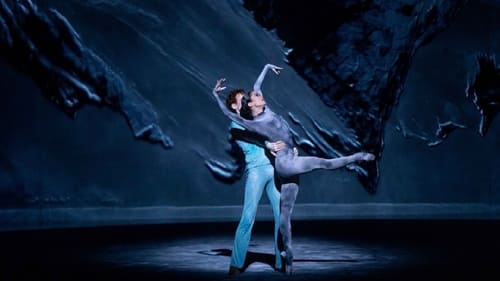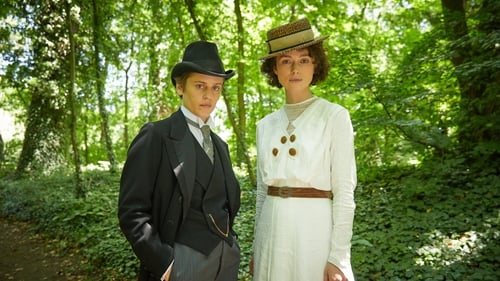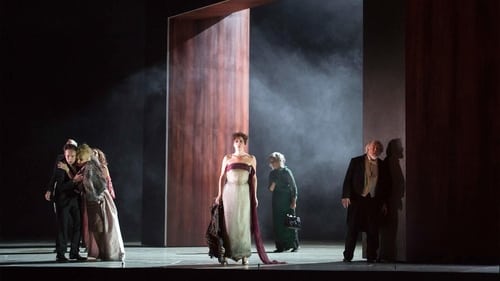
Music
The Dante Project, which premiered in London in October 2021, is today entering the Paris Opera’s repertoire. To a colourful orchestral score by Thomas Adès, British choreographer Wayne McGregor presents a three‑act ballet inspired by the alternately chilling and sunlit landscapes of the Divine Comedy. Written in the 14th century by Dante, this seminal poem of the Italian language recounts an initiatory journey through Hell, Purgatory and Paradise.

Music
This film captures Rattle's very first performance as Music Director; a programme in which British composers took centre-stage. The world-premiere of Helen Grime's Fanfares, which became the first movement of the work Woven Space, opened the concert before violinist Christian Tetzlaff took to the stage to perform the concerto written for him in 2010 by Harrison Birtwistle. Two more works close to Rattle's heart followed: Thomas Adès' Asyla and the pocket-sized Symphony No 3 by the late Oliver Knussen. Finally, Rattle's stunning interpretation of the Enigma Variations brought the concert to a close and then the audience to its feet, filling the Barbican Hall with rapturous applause.

Musician
After marrying a successful Parisian writer known commonly as Willy, Sidonie-Gabrielle Colette is transplanted from her childhood home in rural France to the intellectual and artistic splendor of Paris. Soon after, Willy convinces Colette to ghostwrite for him. She pens a semi-autobiographical novel about a witty and brazen country girl named Claudine, sparking a bestseller and a cultural sensation. After its success, Colette and Willy become the talk of Paris and their adventures inspire additional Claudine novels.

Conductor
After marrying a successful Parisian writer known commonly as Willy, Sidonie-Gabrielle Colette is transplanted from her childhood home in rural France to the intellectual and artistic splendor of Paris. Soon after, Willy convinces Colette to ghostwrite for him. She pens a semi-autobiographical novel about a witty and brazen country girl named Claudine, sparking a bestseller and a cultural sensation. After its success, Colette and Willy become the talk of Paris and their adventures inspire additional Claudine novels.

Orchestrator
After marrying a successful Parisian writer known commonly as Willy, Sidonie-Gabrielle Colette is transplanted from her childhood home in rural France to the intellectual and artistic splendor of Paris. Soon after, Willy convinces Colette to ghostwrite for him. She pens a semi-autobiographical novel about a witty and brazen country girl named Claudine, sparking a bestseller and a cultural sensation. After its success, Colette and Willy become the talk of Paris and their adventures inspire additional Claudine novels.

Original Music Composer
After marrying a successful Parisian writer known commonly as Willy, Sidonie-Gabrielle Colette is transplanted from her childhood home in rural France to the intellectual and artistic splendor of Paris. Soon after, Willy convinces Colette to ghostwrite for him. She pens a semi-autobiographical novel about a witty and brazen country girl named Claudine, sparking a bestseller and a cultural sensation. After its success, Colette and Willy become the talk of Paris and their adventures inspire additional Claudine novels.

Co-Writer
After the acclaimed Met premiere of Thomas Adès's "The Tempest" in 2012, the composer returned with another masterpiece, this time inspired by filmmaker Luis Buñuel's seminal surrealist classic "El Ángel Exterminador", during the 2017–18 season. As the opera opens, a group of elegant socialites gather for a lavish dinner party, but when it is time to leave for the night, no one is able to escape. Soon, their behavior becomes increasingly erratic and savage. The large ensemble cast tackles both the vocal and dramatic demands of Adès's opera with one riveting performance after another. Tom Cairns, who also penned the work's libretto, directs an engrossing and inventive production, using a towering wooden archway to trap the characters onstage. And Adès himself takes the podium to conduct the frenzied score, which features a host of unconventional instruments, including the eerie electronic ondes Martenot.

Original Music Composer
After the acclaimed Met premiere of Thomas Adès's "The Tempest" in 2012, the composer returned with another masterpiece, this time inspired by filmmaker Luis Buñuel's seminal surrealist classic "El Ángel Exterminador", during the 2017–18 season. As the opera opens, a group of elegant socialites gather for a lavish dinner party, but when it is time to leave for the night, no one is able to escape. Soon, their behavior becomes increasingly erratic and savage. The large ensemble cast tackles both the vocal and dramatic demands of Adès's opera with one riveting performance after another. Tom Cairns, who also penned the work's libretto, directs an engrossing and inventive production, using a towering wooden archway to trap the characters onstage. And Adès himself takes the podium to conduct the frenzied score, which features a host of unconventional instruments, including the eerie electronic ondes Martenot.

Conductor
After the acclaimed Met premiere of Thomas Adès's "The Tempest" in 2012, the composer returned with another masterpiece, this time inspired by filmmaker Luis Buñuel's seminal surrealist classic "El Ángel Exterminador", during the 2017–18 season. As the opera opens, a group of elegant socialites gather for a lavish dinner party, but when it is time to leave for the night, no one is able to escape. Soon, their behavior becomes increasingly erratic and savage. The large ensemble cast tackles both the vocal and dramatic demands of Adès's opera with one riveting performance after another. Tom Cairns, who also penned the work's libretto, directs an engrossing and inventive production, using a towering wooden archway to trap the characters onstage. And Adès himself takes the podium to conduct the frenzied score, which features a host of unconventional instruments, including the eerie electronic ondes Martenot.

Conductor
Composer Thomas Adès conducts the Met premiere of his powerful opera based on Shakespeare’s last play, in Robert Lepage’s brilliantly inventive production. Simon Keenlyside is the magician Prospero, who conjures the storm that shipwrecks his enemies and sets in motion the course of events. Rising Met stars Isabel Leonard and Alek Shrader are the young lovers, Miranda and Ferdinand, Alan Oke sings the sinister Caliban, and Audrey Luna gives a memorable performance as the sprite Ariel.

Original Music Composer
Composer Thomas Adès conducts the Met premiere of his powerful opera based on Shakespeare’s last play, in Robert Lepage’s brilliantly inventive production. Simon Keenlyside is the magician Prospero, who conjures the storm that shipwrecks his enemies and sets in motion the course of events. Rising Met stars Isabel Leonard and Alek Shrader are the young lovers, Miranda and Ferdinand, Alan Oke sings the sinister Caliban, and Audrey Luna gives a memorable performance as the sprite Ariel.

Compositor
Penned by composer Thomas Ades, this contemporary opera is based on the life of the Duchess of Argyll (played by Mary Plazas), who's fallen on hard times in old age. A notoriously oversexed money-grubber in her younger days, the down-and-out duchess faces eviction from the hotel she calls home. Heather Buck, Daniel Norman and Graeme Broadbent also star in this uninhibited production, with Ades conducting the Birmingham Contemporary Music Group.

Conductor
Penned by composer Thomas Ades, this contemporary opera is based on the life of the Duchess of Argyll (played by Mary Plazas), who's fallen on hard times in old age. A notoriously oversexed money-grubber in her younger days, the down-and-out duchess faces eviction from the hotel she calls home. Heather Buck, Daniel Norman and Graeme Broadbent also star in this uninhibited production, with Ades conducting the Birmingham Contemporary Music Group.

Music
In the centre of the gallery is a pavilion housing the 35mm film Paradise (2021), the final work of the trilogy. It is the first time that Paradise is being shown as an artwork outside of its staging in the ballet. The soundtrack is a digital simulation of Thomas Adès’s orchestrated score Paradiso. Known technically as a MIDI, the computer simulation became an invaluable tool while the orchestra were unable to record the music during the Covid-19 lockdowns. Paradise was filmed in the extended format Cinemascope and is entirely abstract, drawing on the circular and planetary motifs present in Dante’s ‘Paradiso’. The film’s rich colours were taken from the palette of William Blake (b. 1757 – d. 1827, London) and can also be seen in the ten hand-printed silkscreen prints representing the planetary states in the corridor.













